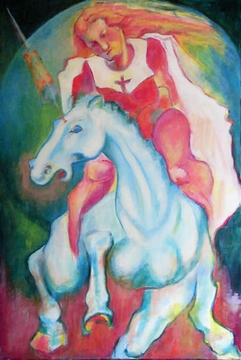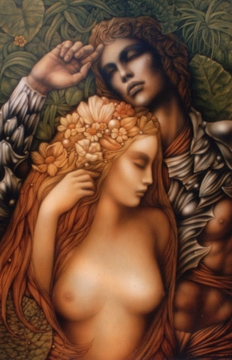Parsifal
is an opera, or music drama, in three acts by Richard Wagner. It is
loosely based on Wolfram von Eschenbach’s Parzival, the medieval epic
poem of the Arthurian knight Parzival (Percival). The poem is commonly
dated circa the first quarter of the 13th century. The poem is, in part,
an adaptation of Chretien de Troyes’ Perceval, the Story of the Grail
and mainly centers on the Arthurian hero Parzival (Percival in English)
and his long quest for the Holy Grail, following his initial failure to
achieve it. A long middle section is devoted to Parzival’s friend Gawan
and his adventures defending himself from a false murder charge and
winning the hand of the maiden Orgeluse.
Book I opens with the death of King Gandin, Parzival’s grandfather. His oldest son, Galoes, receives the kingdom but offers his brother Gahmuret the land of Anjou in fief. However, Gahmuret departs to gain renown. He travels to the African kingdom of Zazamanc, whose capital is under siege from two different armies. Gahmuret offers his services to the city, and his offer is accepted by Queen Belacane. He conquers the invaders, marries Queen Belacane, and becomes king of Zazamanc and Azagouc. Growing bored with peace, Gahmuret steals away on a ship, abandoning his pregnant wife. Belacane later gives

Parzival, acrylic by Izabel Ea-kapu
birth
to a son, Feirefiz, whose skin is black with white spots.
In
Book II, Gahmuret returns to the West, where he meets and marries Queen
Herzeloyde. Ever restless, however, he soon returns to fight for the
Baruch in the Far East, where he is later killed by a treacherous
acquaintance.
Book
III tells of how the pregnant Herzeloyde, grief-stricken at her
husband’s death, retires to a secluded forest dwelling and vows to
protect her new child, Parzival, from the ways of knighthood at all costs
by raising him entirely ignorant of chivalry and the ways of men. His
seclusion is shattered by four knights passing who tell him of King
Arthur’s court at Camelot. Enamored, he decides to go join Arthur’s
court. His mother is heartbroken at the news of his decision but allows
him to depart, dressing him in fool’s garments in the hopes that the
knights will refuse to take him in. Soon after his departure she dies,
utterly bereft.
